Ann Voskamp's Blog, page 18
July 1, 2024
Your Gentle Invitation to Exhale In This Season
I was tenderly moved by this woman’s heart and powerful story: Jodi H. Grubbs, a former island girl, fell headlong into the endless rush and exhaustion of hustle culture in the United States as an adult. But soon she realized God was bidding her to a return to the “island time” of her past. Jodi found sanctuary and ways to care for her soul by making space for God, others, and herself as she learned of another path away from burnout and toward restoration. Jodi invites you to grasp a sustainable approach to life anchored by the forced pauses of spiritual practices and an openhandedness before God. It’s a joy to welcome Jodi to the farm’s table today…
Guest Post by Jodi Grubbs
It was early on a summer morning, and I was barely awake. Sunrise was imminent.
I was twenty-seven years old and holding tight to my fresh dream of moving to Murrells Inlet, a small South Carolina coastal town we had just returned from visiting. Little did I know how many of my dreams would vanish that day.
I ran out of our bedroom to call 911 at my husband Brian’s request.
A kind voice answered at the other end, but at the sound of Brian’s body crashing onto the floor, I left the phone dangling. I quickly retraced my steps to find Brian dying. His aorta had ruptured, and he bled to death in less than two minutes, with me by his side.
The sound of breath, of life, leaving his body was louder than I had expected. It was a literal soft whooshing sound.
The closest thing I had ever experienced was when I was fifteen. A thirty-foot whale shark surfaced right next to where I drifted with my friend in a small sailboat. Both situations were terrifying and yet beautiful in inexplicable ways. Both caught me by surprise and formed a lump in my throat.
But that morning, as I felt bewilderment, fear, and disbelief, I wondered if I was caught up in a nightmare.

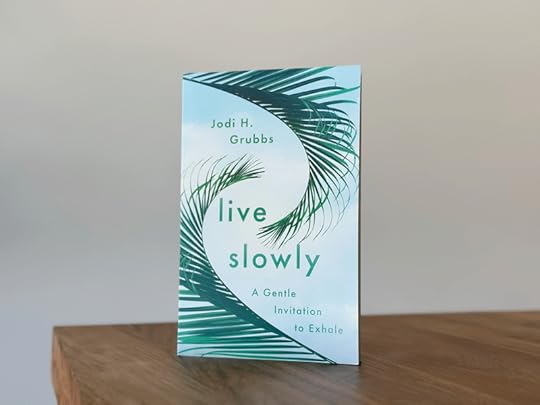




Two years prior, on a summer afternoon, coming around the bend in the road on Interstate 85 near Atlanta, Brian was riding as a passenger in a work truck that inadvertently found itself in the middle of a road rage incident. Brian had nowhere to go; he was crushed under a semitruck in this most horrific accident.
“…my biggest fear of slowing down came because I knew I’d need to sit with the hard stuff. I knew that I might not get answers. But mostly, I didn’t want to feel the feelings.“
Life came to a standstill that day.
Due to the actions of strangers, Brian hovered between life and death. That day turned into nine months in the hospital, four of them in a shock-trauma where my island heart saw human suffering so tragic it remains hard to explain.
My grieving was intense that season. It was layered from the trauma my mind and body went through during the months when Brian had so many close calls in the hospital. It feels unbearable when you watch someone endure agony, and you can’t prevent their pain and suffering.
Maybe it’s a good thing we don’t write our own stories.
Sure, we make decisions, we plot a course, and go full steam ahead with our hopes and dreams—but we don’t actually write our story.
Our story fits into his Story and is woven in with other stories so big it’s hard to imagine we are part of them.
And yet we are.
“Our story fits into his Story and is woven in with other stories so big it’s hard to imagine we are part of them... And yet we are.“
I still don’t know the “why” of my story. I suppose I don’t have to. You, too, may have a story that has left you wondering why. Maybe the unthinkable has happened to you. Maybe, what you had hoped would happen didn’t.
Looking back as an adult, it sometimes seemed that my years as an island child were like living in the Garden of Eden. Such a beautiful, pristine dot in the world—a theology of slow living in the making. After college, I thought I would bring my peaceful, slow-paced island life with me as I got married and moved to Georgia. Sixteen years of slow island living in my formative years laid the groundwork for my life; but as often happens, a shattering life moment, like a crashing wave, threatened to tear apart the life I knew.
For so many years after this double tragedy of Brian’s accident and later death, my biggest fear of slowing down came because I knew I’d need to sit with the hard stuff. I knew that I might not get answers.
But mostly, I didn’t want to feel the feelings.

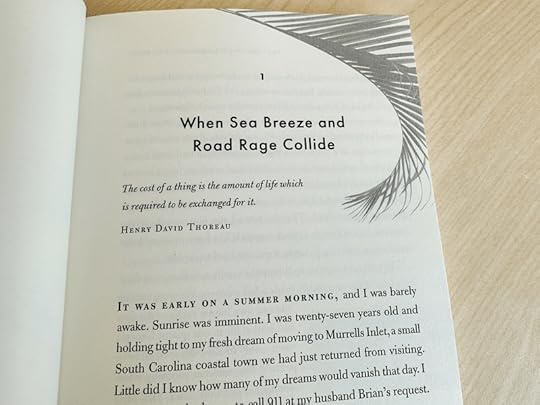
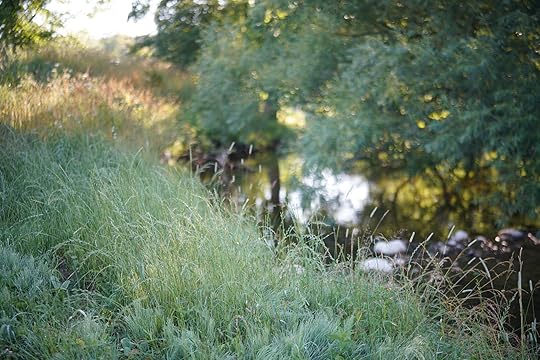


If you’re like me, there are times when it’s easier to keep busy: head down, putting one foot in front of another. Until we can’t.
“Our bodies and our minds were not meant to keep up this wild pace. What we desperately need is a shift, a collective exhale as we find our way again.“
When we burn out from the busyness and we are forced to stop, this is our invitation to take inventory of all the unsaid, the undone, the unobserved. This divine pause creates time to reflect and gives us the opportunity to shift. It opens up a whole new world if we only let it. Our bodies and our minds were not meant to keep up this wild pace. What we desperately need is a shift, a collective exhale as we find our way again.
It’s perfectly fine to tell God you are tired and weary and need to exhale and rest. He wants to guide you.
I am more settled these days. I finally accepted that grief and joy do hold hands throughout life—when sea breeze and road rage collide. I understand that God kept me rooted in a nourished space. I was held in those rough waves. On the island. In the hospital. In my sunroom now. Like the curve out on I-85 in Atlanta, we will have unexpected pain ahead with new bends in the road we travel.
However, you and I are being invited to walk with God. Every day. As if we are in the original garden again. A slow, lingering pace.
Being present. Being attentive. Being in true community.
Being at rest in a crazy world.
*Adapted from Live Slowly by Jodi H. Grubbs. ©2024 by Jodi H. Grubbs. Used by permission of InterVarsity Press. www.ivpress.com.

Jodi H. Grubbs is a slow-living guide living in the Raleigh, NC area, the host of Our Island in the City Podcast, and the author of Live Slowly.
Jodi’s new book, Live Slowly: A Gentle Invitation to Exhale is your permission slip to pause, catch your breath, and rest. Each chapter offers a slow-living shift to help you practice soul care and let go of the need to keep up.
When the pain of being weary and worn out is greater than the fear of missing out or letting someone down, you know you have started the biggest shift of all toward slower living.
{Our humble thanks to InterVarsity Press for their partnership in today’s devotional.}
June 21, 2024
Releasing Wrongs and Restoring Relationships
Have you ever wronged someone, apologized, but never received forgiveness? Or maybe you are on the other end, withholding forgiveness from someone who truly hurt you? Both represent a need for healing. Cassia Glass has gone deep in her studies on the Bible’s teaching of forgiveness and how important it is to apply to our lives. She is a writer, speaker, and cares deeply about drawing you closer to Christ. It’s a grace to welcome Cassia to the farm’s table today…
Guest Post by Cassia Glass
In 1947, Corrie ten Boom, a Dutch Christian who had been interred in Germany’s Ravensbrück concentration camp for hiding Jews from the Nazis, reentered the country where she had been brutally treated and her dear sister died. Her reason?
To tell Germans gathered at a Munich church about the God who forgives.
“When we confess our sins,” she declared, “God casts them into the deepest ocean, gone forever.”
As she prepared to leave the church, she recognized a face in the room: “I saw him, working his way forward against the others. One moment I saw the overcoat and the brown hat; the next, a blue uniform and a visored cap with its skull and crossbones”
“When we confess our sins,” she declared, “God casts them into the deepest ocean, gone forever.”
The man was her former guard from the concentration camp.
“‘I have become a Christian,’ he said. ‘I know that God has forgiven me for the cruel things I did there, but I would like to hear it from your lips as well. Fräulein, will you forgive me?’”
Corrie recounted, “I wrestled with the most difficult thing I had ever had to do. For I had to do it—I knew that.
The message that God forgives has a prior condition: that we forgive those who have injured us. ‘If you do not forgive men their trespasses,’ Jesus says, ‘neither will your Father in heaven forgive your trespasses.’”
Corrie realized in that moment that she could call on Jesus to help her forgive: to make a choice, a decision to follow the One who called her, rather than to respond out of emotion. She took the man’s outstretched hand, and, as she later recounted, “This healing warmth seemed to flood my whole being, bringing tears to my eyes.” She was able to forgive him with her whole heart.







“We may believe in theory that we should forgive others when they sin against us, but the gulf between theory and application widens as we feel the weight of the harm.“
Corrie’s dilemma is ours: We may believe in theory that we should forgive others when they sin against us, but the gulf between theory and application widens as we feel the weight of the harm. Just as Jesus did not gloss over the very real relational debts caused by sin, He also did not give us a free pass on extending forgiveness to those who have hurt us.
Peter, like all of us, wanted to know where the loopholes might be and if there was an expiration date on extending forgiveness. “Is seven times enough?” asked Peter, but Jesus not only offered an extravagantly higher number of seventy times seven but painted a picture of forgiveness so immense that it reframed the discussion entirely.
In the parable that followed Peter’s question, Jesus painted the picture of a king who “wanted to settle accounts with his servants”—using it as metaphor for the ways in which human sin has racked up tremendous relational debt with the King of Kings and prompts an honest acknowledgement of the cost of sin that must be paid in some way.
But that’s where Jesus inserted the plot twist to show the immense mercy of God- “At this the servant fell on his knees before him. “Be patient with me,” he begged, “and I will pay back everything.” The servant’s master took pity on him, canceled the debt, and let him go (Matthew 18:24-27).”
Jesus’ audience would have understood a well-known cultural practice and principle here. When poor crops or other circumstances forced a ruler to forgive taxes, he did so with the understanding that his people would respect his benevolence. If he released his subordinate ministers’ debts, they in turn must release the debts of those indebted to them.
“Jesus not only offered an extravagantly higher number of seventy times seven but painted a picture of forgiveness so immense that it reframed the discussion entirely.“
However, the forgiven man who, instead of being humbled and transformed by the immense sacrifice of a king who took on the full debt himself, snubbed the king’s gift. He reacted in fury over a small debt from a fellow servant, throwing him into debtor’s prison.
The parable shows the ripple effect of unforgiveness and unchecked anger. The fellow servants in the parable took notice of the first man’s actions and “outraged, went and told their master everything that had happened” (18:31). The larger community was bruised and had their righteous anger kindled by the first man’s wrathful unforgiveness.
That man sought restitution with a vengeance instead of moving toward mercy and forgiveness, and it harmed the community by breaking a principle of graciousness established by the king.
When the king in the parable justly revoked his earlier pardon, consigning the unforgiving man to debtor’s prison to be “tortured until he should pay back all he owed” (18:34), Jesus was warning his audience and us not to trespass on God’s gracious forgiveness but also reminding us that we exist within a community whose wholeness and peace matter to God.





We honor God in the communities where we lead when we help others to see the twin truths of this passage—that while we are not to ignore or downplay wrongdoing, and indeed honest anger can help reveal the cost of sin, we are also not to withhold forgiveness from our “fellow servants” since we have been forgiven an enormous debt by God.
“There is no promise from Scripture that forgiveness is easy, but it is the path forward to healing.“
There is no promise from Scripture that forgiveness is easy, but it is the path forward to healing.
By the standards of this world Corrie had every right to refuse to forgive her former prison guard. And yet, she remembered to call upon Jesus to help her forgive in that difficult moment. The healing for her was immediate; the healing that rippled out into the community was done one brave, merciful decision at a time.
Lord, may we remember to call upon our savior when it is hard to forgive; when it is hard to see someone who has hurt us as a “fellow servant”.
King of Kings, thank you for the forgiveness you have shown us. May we show a fraction of that mercy to others. Thank you for your son, who stands ready to give us His strength and fill us with the healing power of forgiveness.
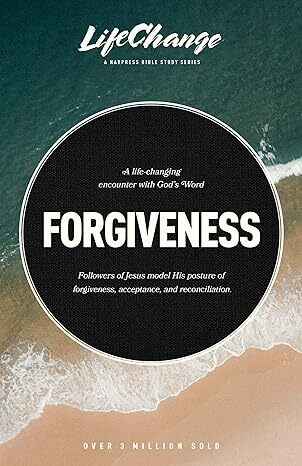
Keep reading and learning with Cassia in her Lifechange Bible Study- Forgiveness: A Bible Study on Releasing Wrongs and Restoring Relationships. This small-group study traces the concept across both the Old and New Testaments to reveal the God who forgives and empowers us to forgive others. Lifechange Bible studies have sold over 3 million copies and cover every book of the Bible and important topics. They train you in good Bible study practices as you enjoy an engaging study of Scripture.
Cassia Glass is the small groups and discipleship director at Faithbridge Church in northwest Houston. She is also a retreat speaker and writer, and holds a master’s degree in church history and theology. She and husband McLeod are happy empty nesters with two young adult children. For more on faith, family, and finding purpose visit her at cassiaglass.com.
{Our humble thanks to NavPress for their partnership in today’s devotional.}
June 18, 2024
Why You Really Matter Beyond All Matter: The Sacred Breath that Fills Your Lungs
Almost three years ago, Caleb, my eldest son, dreamed of a children’s book that would capture the marvel and wonder of God’s creation and the unique beauty of every individual. The vision was to create a story that not only delights but also reflects the breathtaking truth of God’s handiwork, culminating in the wondrous affirmation that He has made and loves you so uniquely! It’s with immense joy and a heart full of celebration that I invite our oldest son, Caleb, of The Keeping Company, to share their brand new children’s book “God Made Only One You” — a creatively inspiring book that takes children on a playful and poetic journey through God’s creation, celebrating the unique and deeply loved person they are. It’s an absolute pleasure to welcome Caleb, his wife Melba — and a soon-to-arrive surprise guest (!!) — to the farm’s wide kitchen table, to unwrap this beautiful story for you!
J
ust a few short weeks before my grandfather’s death, in a vulnerable moment of real discouragement, he asked me, “Really – in a hundred years, who will know or care?”
When our earthly selves have returned unto the dust from whence we came… will anything in this life have truly mattered?
I think, for the most part, Grandpa didn’t actually believe that statement. I don’t think he actually believed the “all is meaningless” sentiment behind the question – but I do think he was voicing a very real feeling that can sometimes gnaw away at any of us, including the writer of Ecclesiastes himself, who echoed: “For who knows what is good for a person in life, during the few and meaningless days they pass through like a shadow?” (Ecc. 6:12).
When everything is done and dusted, when the dust finally settles… when our earthly selves have returned unto the dust from whence we came… will anything in this life have truly mattered?
 Little Caleb, my little brother, Joshua, and Grandpa ,all playing in a wagon of freshly combined corn, nearly 25 years ago
Little Caleb, my little brother, Joshua, and Grandpa ,all playing in a wagon of freshly combined corn, nearly 25 years ago Celebrating one of Grandpa’s last birthdays on this earth, not that many years ago.
Celebrating one of Grandpa’s last birthdays on this earth, not that many years ago. The grass withers, the flower fades, but the word of our God will stand forever.
The grass withers, the flower fades, but the word of our God will stand forever.Turns out, my grandfather wasn’t alone in voicing that question in that moment. It’s a question that has been voiced by many… by Job (Job 14:1-2), by the Psalmist (Psalm 39:4-5), and by philosophers, scientists, and theologians for centuries. Even Nietzsche once said that with a “why”, a man can bear any “how”… but finding the “why”…now that’s the rub.
But if I could go back and do it all over again, I’d have a different answer.
In a hundred years, what will any of this have mattered? That right there is the voice that questions our “why”.
Why does any of this life on earth really matter?
I really wish I could say that in the moment that my Grandfather had voiced his fear, I had told him the answer that King David had found. But I didn’t – instead, I pointed out his family, the incredible work he had done with his life, and the promise that the warm spring ahead held.
But if I could go back and do it all over again, I’d have a different answer.
I’d have David’s answer.

 This little children’s book is written in delightful whimsical free verse!
This little children’s book is written in delightful whimsical free verse! 
 Each artwork in this book contains a hidden Bible verse, reinforcing the gospel truths told in the poetry.
Each artwork in this book contains a hidden Bible verse, reinforcing the gospel truths told in the poetry.When David wondered why any of us – mere specks of dust in the massiveness of the universe – matter at all, this is what he says with all assurance:
When I consider your heavens,
the work of your fingers,
the moon and the stars,
which you have set in place,
what is mankind that you are mindful of them,
human beings that you care for them?
You have made them a little lower than the angels
and crowned them with glory and honor.
You made them rulers over the works of your hands;
you put everything under their feet:
all flocks and herds,
and the animals of the wild,
the birds in the sky,
and the fish in the sea,
all that swim the paths of the seas.
Lord, our Lord,
how majestic is your name in all the earth!
Psalm 8:3-9
Why do we matter? Why does anything matter? The answer is really quite simple — and really quite profound. We matter, because we were created specifically and uniquely by God.
We exist, we draw every breath, because God created us, in His image, to bear His glory in His marvellous creation. The very existence of our humanity, our physicality, is testimony to His glory, power, and might…and that is the ultimate “why”.
How I wished I had turned to Grandpa and said:
That’s why, among all the atoms of matter… you matter.”
“The incomprehensibleness of it all is that, in an infinite universe of time and space that is expanding at the speed of light, strewn with countless stars of incomprehensible size, you do matter, because God made you. God cares for you.
That’s why, among all the atoms of matter …. you matter.”
That’s why all of us, and all that we do, matters now, and why our legacies will matter in a hundred years… because this glorious, marvellous, incredible universe is a story that each one of us has specifically been made part of… by very God Himself.
And that is an answer I want to get right in the future, the next time someone asks me.
And maybe the next time, it won’t be someone from the generation that’s gone before me, asking me in a moment of doubt…maybe next time it will be the generation coming behind, asking me in wide-eyed curiosity and wonderment.


 Our little gift to our little one!
Our little gift to our little one!For the last 8 months, God has been fearfully and wonderfully creating a precious baby that my wife, Melba, and I anticipate welcoming home mid-July, Lord willing. We are so incredibly blessed to be able to bring this baby into the story God is working for His purposes and glory, and we could not be happier or absolutely more grateful!
And, for the last two years, Melba and I have also been working to create our own little testament to God’s glory. We truly believe in the importance of this message, this story, that each of us exists purely to bring God glory and honor and joy and delight.
And that’s a story worth celebrating, with every generation, both young and old, and so we created, with our incredibly talented sister-in-law, Aurora McGee Voskamp, a little children’s book that celebrates counting down ten of God’s countless wonders and blessings, culminating with the miraculous wonder that God Made Only One You.
 How every book comes wrapped to your doorstep!
How every book comes wrapped to your doorstep!

(If you would like to join us, we’d love to slip a storybook in the mail for you and yours)
This is a story that I deeply wish my Grandfather could read to his great-grand baby, a story that celebrates the ultimate why of why we matter — that takes the very deepest joy in counting the gifts God has given us — and how the best one of those gifts is that we each are specifically, beautifully, uniquely designed and created by a God who cares for us, loves us, and has woven together all of time and history and all matter as a gift for us.
Sometimes we need to tell the story, and tell it again, of how every single one of us is fearfully and wonderfully made, breathing breath given by the Creator of the Universe, the same breath that breathed the stars and galaxies into existence.
Our lives always matter simply because God made all matter and what He makes always has worth and matters.
Our lives matter because though our days may be fleeting, your each and every heartbeat is orchestrated in His-story.
Our lives matter because you are treasured beyond measure—God, who is beyond all time and space, has loved you since He whispered you into being in time and space and now.
And sometimes, on the days of deep discouragement and overwhelm, we need a gentle reminder of the why of our being here. Sometimes we need a whimsical lyrical resounding of the astounding, ground shaking reason that we exist. We need the very real assurance that from the very beginning, till now, to a hundred years from now, till beyond the end of time itself, God cares for and loves us beyond our wildest imaginings.
Sometimes we need to tell the story, and tell it again, of how every single one of us is fearfully and wonderfully made, breathing breath given by the Creator of the Universe, the same breath that breathed the stars and galaxies into existence.
For in the vast, astounding, incomprehensible expanse of this incredible universe that God created, even though we are unimaginably tiny compared to the oceans, continents, planets, stars, and galaxies that He spun into being, we are created in His image, for His glory, because He saw fit to form us, shape us, love us, and cherish us —
and that’s why all of this more than matters.
Blown away by early readers who have held the first copies in hand, like Christine Caine:
“God Made Only You should be given to every child to celebrate their God given uniqueness. This is the most beautiful children’s book I’ve read. Give a copy to every child you know.“– Christine Caine, Founder A21 & Propel Women

“God Made Only One You,” is our gift to the next generation, one of the very best ways we know how to begin celebrating with all the little precious souls coming into this world, to live in awe of God’s majesty, His glorious creation, and His abounding, unfailing love and purpose for us.
And we can’t wait to share this story with you! “God Made Only One You” is now available for pre-order in our little shop and also on Amazon, can also be a gift to you, and any (or all!) of the precious little souls in your life who could be delighted and astonished at the promise of being God’s child.
– Caleb and Melba… plus one more little God-made soul, very soon!
June 11, 2024
You’re Just Over 43% Through The Year. There’s Time To Reset Your Year & Do This:
The snowball tree out at the mailbox is this flurry of flakes in the middle of June.
So you can go out to get the mail and stand there with all these petals fall around your feet.
You can realize: A year can evaporate before you know it.
In the middle of all kinds culture of noise and outrage, where judgement can be be our dialect of choice and angry, finger pointing posts can go viral and sicken our communal well, you can just want to stop at the end of the lane and watch the sun for a moment over the fields.
“The best way to live a good year is to do a reset halfway through the year.”
You can want to really live, and really, actually, smell the flowers and inhale deeply, you can want to make your moments count, want to make your days make something meaningful, that will last beyond all of the loud.
You can walk into the house, sort the mail, put the farm paper down on the table, turn and look at the calendar and just quietly exhale:
The best way to live a good year is to do a real reset just before you’re halfway through the year.
June is the Second January — and now is the time to not waste another second, because the way you spend your seconds is how you’re making your life.




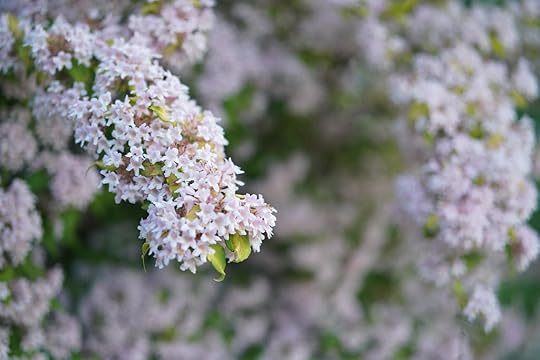
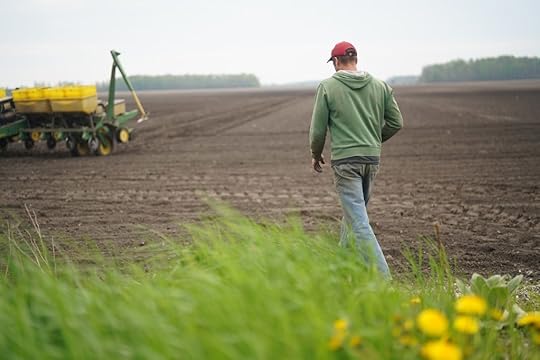
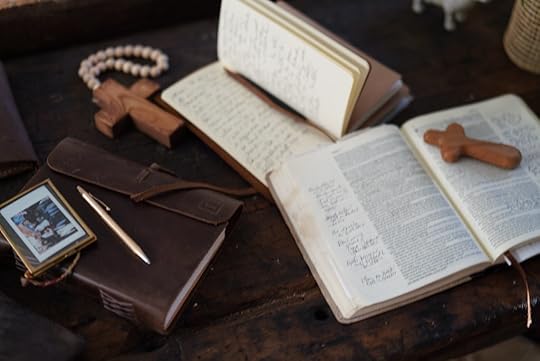


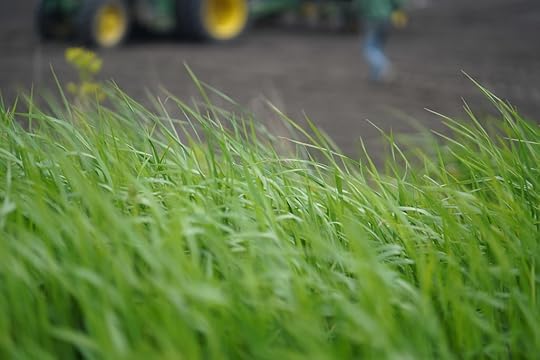

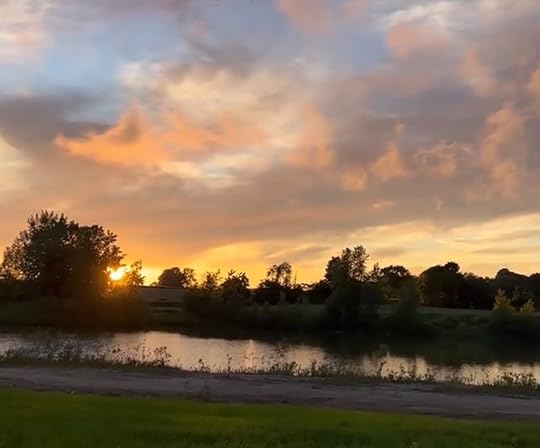
Get up early and watch the sun rise. Like you open a window, open your heart to God.
Open a window so you can breathe it all in, and open your heart wide open to God. Open His Word. Linger. Gaze on the One who never stops gazing on you.
What you look upon — is what your soul becomes like.
Pour a steaming cup of something. Don’t try to face anything facing you — until you’ve faced Him: First 10 Minutes always with your First Love.
Always: Word In. Work Out. Then Work the Day’s Plan.
I set a vase of snowballs out in the middle of the table. The light catches in them, frees something in us.
Since the Farmer first planted our crops, you can see how he’s walked the fields. How he has time to breathe, how he has time to bend and watch how seeds grow.
You can see it, when you watch how he works:
“To love your life, do nothing with rush or resentment, but do everything with deep love for here and now and God.”
To love your life, do nothing with rush or resentment, but do everything with deep love for here and now and God.
Every morning, there’s this simple habit of making our bed, smoothing out the coverlet under my hand. This is a small way to I love us.
He works late into the night, stays up with a sow giving birth. He tells me this without saying a word, just by the way he smiles:
He makes the most of his work — who makes most of this gift of actually getting to do his work. Because this makes the most of the grace of God.
When he walks the rows of his fields, I watch him at the window:
He’s not looking to be seen or noticed, he’s not looking to jump on any soapbox or get anyone riled up — anger and outrage and striving and discontent can be exhausting — and anywhere there’s outrage, there needs to be outreach.
Let the world go ahead and get loud and large. There are fresh starts in our daily quiet starts. There are small and hidden seeds that are growing into forests, that are growing into the greatest yield.
Growth takes time and this need not take us by surprise.
Change is a slow and steady process and Christ is steady in His sure work to remake you:
“I am convinced and confident of this very thing, that He who has begun a good work in you will [continue to] perfect and complete it until the day of Christ Jesus [the time of His return].” Phil. 1:6 AMP
The doorway to change is as powerful as, moment by moment, opening your heart to God.
Keep practicing a deep awareness of His presence.
When the Farmer walks the fields, no, he’s not thinking of sales or return on investment — because he knows that: Successful people are the ones who choose to let the joy and satisfaction of simply getting to show up be their real reward.
“Genius is only a fraction of cleverness and ninety-nine percent just the faithfulness of a very long endurance.”
The Farmer lives that everyday: Genius is only a fraction of cleverness and ninety-nine percent just the faithfulness of a very long endurance.
Keep going and never, ever give up — and you can when you keep going with God, when you keep looking up.
It’s its own kind of miracle everyday: When you work faithfully, creativity comes faithfully.
Keep showing up before the face of God — because this is how you never, ever give up.
It’s never, ever too late to begin again. Every June can be about new beginnings in Him.


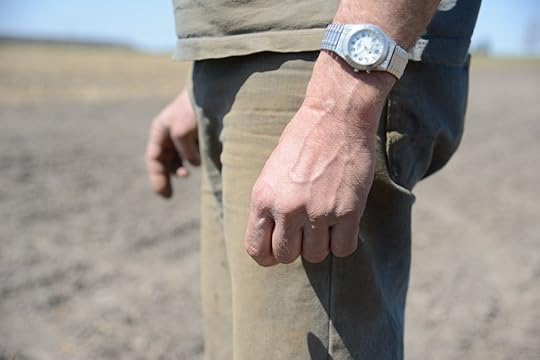


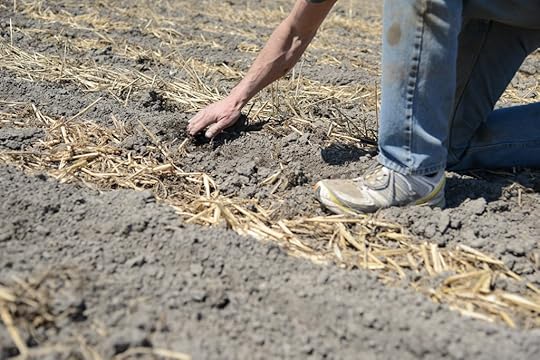
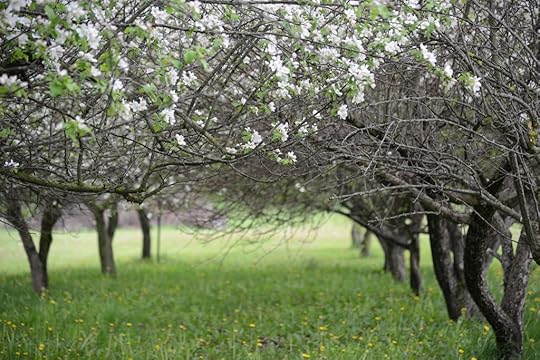
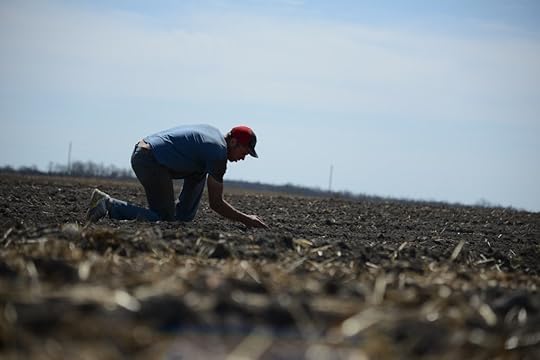
You can even tell by the way he wears his cap, by the way his smile comes easy out in a field of seeds: He makes it a habit to hope. Even in the middle, even when you have to begin again.
Let every moment be a seed that opens to God to grow real change within.
“Change your habits and your trajectory — and you can change anything into a possibility.”
Change your habits and your trajectory — and God can change anything into a possibility.
I light a candle every day. Write a bit in my journal, not words of mine, but Words of His, copied out, like writing them with my hand can shape my hand, can shape a life. These are simple practices, life-giving habits.
We set timers for our work, each of us, the best timers, used at the piano, at the computer, at the desk.
My Professor in my Doctor of Ministry program at Biola says these words this week in a lecture to our class, and I write them down:
“Spiritual development and formation will move at the speed of your habits… “
I can’t stop thinking about this:
Our habits unclothe us — they expose our wounds, our insecurities, our idols, our addictions — or our hopes, our dreams, our prayers. Our habits are so much us.
The shape of our days reveals much about the shape of our souls.
“The shape of our days reveals much about the shape of our souls.”
A pail with a pinhole loses as much as the pail pushed right over. A whole life can be lost in minutes wasted… in the small moments missed.
Read more words on papers than on screens.
Make gratitude your attitude of habit — there’s no other way to make joy your life.
Every little day just has to be just a little bit better: Small things done consistently, consistently make the biggest turn around.
And you get to do hard & holy things, you can do hard and holy things — for the joy, for the love.
Because whatever you do for joy, you can do forever.


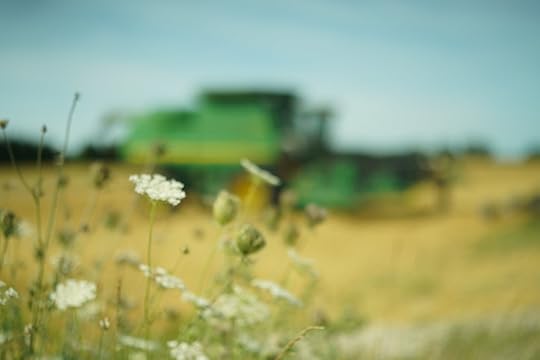



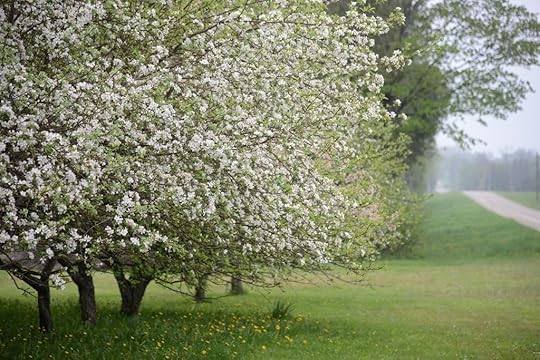
“You change your life when you change what you do everyday.”
How resistant are our habits to the ways of God?
How recalcitrant are our habits to opening to the power of the Spirit of God who has the power to change our souls, our whole lives?
Habits matter because they are what keep us, moment by moment, turning us to His Spirit, and it’s the Holy Spirit alone who is the spine of our self-control.
You change your life when you change what you keep turning to every day.
I listen to His Word while I wash my face. Set the timer on my phone to make a complete hard stop and pray — because life without hard stops crashes. Habits are small gears that leverage your life, that turn you away or toward His Spirit — and the habit of hoping in Him can resuscitate anything.
Even what looks like it has a snowball’s chance in hades of happening or changing…
The snowball tree releases petals in the wind, a habit of letting go and hoping better things….
And all these small seeds keep across the field grow —
like this growing trust that the smallness of A Seed Life, of faithfully stewarding seed moments to keep opening to the Spirit of God, is what slowly grows a life of astonishing abundance.
This is the sure and certain promise of God.
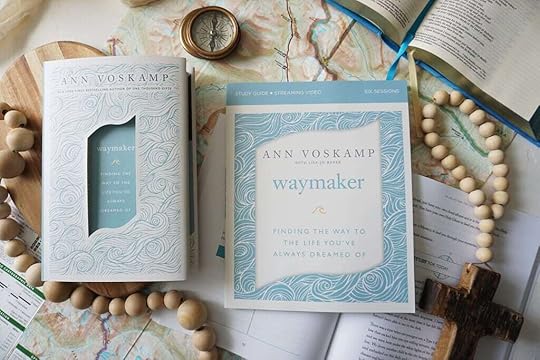
When you want to know & see signs of His loving-kindness…
When you want to know a real way through the world — the map of your own heart, and the map of God’s….
When you’re looking for a reset, a turn around, a different trajectory…
For every person who has faced a no-way sign on the way to their dreams, WayMaker is your sign, that there is hope, that there are miracles, and that everything you are trying to find a way to, is actually coming to meet you in ways far more fulfilling than you ever imagined.
Gr ab Your Copy of WayMaker — and begin the journey you’ve secretly been hoping for.
June 6, 2024
The Secret to Women “Doing & Having it All” — & how We Can All Give Each Other Grace
R
ain fell quiet on a tin roof this past week, when the world’s been more than a bit loud with all the opinions about all things the past few weeks.
The rocking chairs out in the ash grove sit quiet, solid right now — steady in the wind.
Steady in the wind. They’re calling for more rain this week, for it to just keep on coming.
Our littlest and I, we make fresh scones, wash and slice the strawberries.
And there’s this deep peace that keeps coming, in the midst of all the things, to have these moments of just not coming and going at all.
It’s happens when we rest — that we relinquish all our ambitions to be like God.




You know how it is: There’s always asks, and more asks, to do this thing over here, or do this work, this thing, over there.
The internet age may try to sell us all something different, but don’t ever forget that viral is actually closely associated with sickness — and focusing on numbers can make you nauseated. Forget the numbers in your work. Focus on the net value of your work.
And the thing is: Asks aren’t obligations. Asks are just options.
The Farmer says it quiet to me over bacon and eggs flipped sunny side over: Every “yes” automatically says “no” somewhere else.
I’ve had my seasons of saying my quiet “nos” — so I could say more “yeses” to kids and laughing hard over bad jokes and memorizing all their faces.
Because it doesn’t matter what any gatekeeper says: Mothering a mess of kids is as important as preaching to a stadium for a month of Sundays.
And? The size of your ministry isn’t proof of the success of your ministry. The very Son of God had a ministry to 12. And even one of them abandoned Him. Forget the numbers in your work. Focus on the net value of your work.
Sure: The internet age may try to sell us all something different, but don’t ever forget that viral is actually closely associated with sickness — and focusing on numbers can make you nauseated.
Someone long ago sent me this interview that Indra Nooyi, CEO of Pepsi, named by Fortune the #1 most powerful woman in business in the world in 2009 and 2010, and mother of two, and I have never, ever forgot it, how she gave, what some are deeming, the interview of the year:
“I don’t think women can have it all. I just don’t think so. We pretend we have it all. We pretend we can have it all… Every day you have to make a decision about whether you are going to be a wife or a mother, in fact many times during the day you have to make those decisions…”
I have thought about Indra’s Insight countless times over the last several years, while I make decisions about what to say yes to, what to say no to, what is the season for certain things — and what is not yet the time or the season. And I always think about her words this time of year, when I’m making decisions out in the garden over strawberry plants.
While I bend over each strawberry plant, when I press the delicate white petals between thumb and index finger —and then just pluck it off. So there’ll be no strawberries this year.
It’s really what you have to do, what all the expert gardeners tell you to do: “Pick off all first blooms to ensure subsequent harvests are more plentiful.”
Cut out that which seems good to invest in the best. Early sacrifice — for later bounty.
If you ever intend for the strawberries to produce heavily throughout the season, you have to choose to sacrifice the first harvest, so that all the growth and energy could be more efficiently invested into producing later crops.
Cut out that which seems good to invest in the best.
It is the law of life: Early sacrifice — for later bounty.
For years, in the midst of all kinds of opinions, I’ve looked over the calendar and the schedule and there’s Indra’s Insight and there’s this raising seven of kids, there’s these seasons of saying no to certain things, there’s this trimming back, there’s this letting go.
It can be hard to prune good things that are blooming. It can be hard to remember why you are pruning.
Because there’s a counter-intuitiveness to it, this plucking off certain life activities that would actually yield good fruit. Some might even think it foolish to pare back, when the bloom and gifting apparent; a good harvest inevitable.
Yet it’s the pruning of seemingly good leaves that can grow a better life. To allow later seasons to yield the longed-for abundant crop.

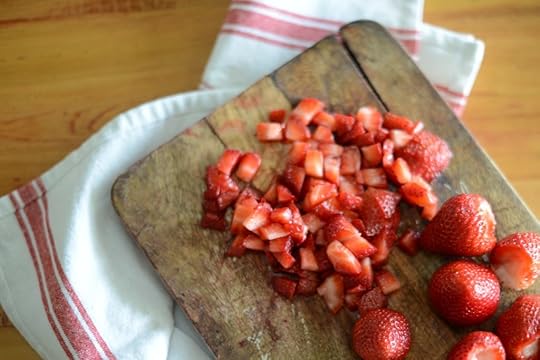


It takes courage to crop a life back —but it’s exactly the way to have the best crop of all.
What seems like hard work that’s taking an eternity today — is exactly what may make the most difference in eternity.
Indra’s Insight rings loud. ‘You can have it all’ — isn’t the whole truth.
No matter where you are — it’s never all easy.
A crop is made by all the seasons and the only way to have it all — is not all at the same time … but letting one season bring its yield into the next season.
A crop is made by all the seasons and the only way to have it all — is not all at the same time … but letting one season bring its yield into the next season.
This is how to have no fear about “having it all” — it’s trusting that all of the season s, one at a time, makes a full year.
What can seem like a plucking of dreams — may be the wisest of investments. In the later harvest. The sweetest one.
You can see it when you pluck the strawberries, hoe the beans, cut the lettuce, when you stand there in the thickening dusk:
You can see that the garden is one, and yet the garden is a myriad of plants flourishing in their own space, their own way, their own time. Heaven forbid that you’d try to make all the cherry tomatoes into zucchini plants.
If you aren’t encouraging women to live out their particular calling, you may just be idolizing a particular idealized form of yourself.
Heaven forbid any woman would go around and try to make all women into an image of herself .
Heaven forbid any woman would set up her life as a standard — instead of making grace for all women the standard of her life.
Seasons change here. Kids grow up. The house here quiets in all kinds of ways. After finishing up my Masters in evangelism and leadership a few years ago, this Mama here now enrols in a graduate program for her doctorate in ministry. This Mama here enters a new season of reading all the books, writing papers, studying stacks, following the syllabus, one assignment, one book, at a time.
And one woman’s choices and seasons, look different than another’s. One woman’s thrift store donation is happily another woman’s thrift store sensation. And one woman’s ‘no’ can happily be another woman’s ‘yes’. One isn’t necessarily wrong, and the other one certainly more right.
Christ makes us a Body — not a faith factory. He calls us to be Christ followers — not cookie cutters. Break the measuring sticks of comparison — or we break our own souls.
It’s the differences between us that makes us a Body and not a uniform.
Christ makes us a Body — not a faith factory. He calls us to be Christ followers — not cookie cutters. Break the measuring sticks of comparison — or we break our own souls.
Because the bottom line simply is: If you aren’t encouraging women to live out their particular calling, you may just be idolizing a particular idealized form of yourself.
Shiloh prunes new strawberry plants back with me. And we leave the blooms of other, older strawberry plants.
And there’s this fierce trust that the Holy Spirit will bring the bounty of a feast in His time, to feed and grow the Body in His way.
And yeah — we each get to make our own unique decisions knowing we’ve heard God’s unique calling for us.
People will always have opinions about you.
But you live for God, because He’s the only one who has intimate knowledge of you.




People will always have opinions about you. But you live for God, because He’s the only one who has intimate knowledge of you.
Our littlest and I, we wash the kitchen down while the scones cool.
The sun breaks through. The rain on the roof falls silent now. The rocking chairs still in the grove, armrests dripping soundlessly. Steady in wind. Know what you’re about.
The evening light falls long and quiet across the farm table.
There are crops finally coming to maturity — yeses and nos coming in their own right time.
I wash out my cloth at the sink and think about the timing of all the things at their right time: Often the evidence of maturity is responsibility…. response-ability — the ability to make the right response at the right time.
“You want to have one of the scones out in one of the rockers with me?” Shiloh looks up at me grinning, scone in hand.
And there are holy yeses at just the right time, that are just to the one.
And there’s this rain of grace that we are all living under, that makes all things flourish at just the right time.
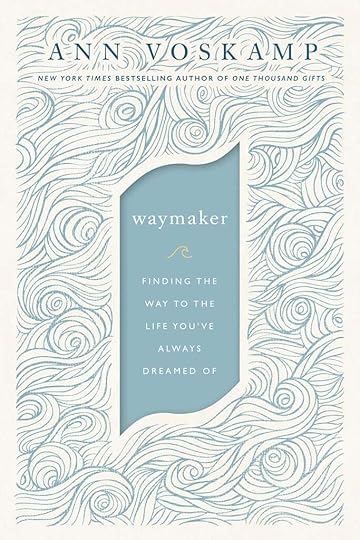
How do you actually practically find way through all kinds of season of change — and find the embrace and comfort and wisdom of God?
What does it personally look like to turn toward God in the midst of changes — instead of turning away?
In the midst of changing seasons, in the midst of trying to know what is the right season for the right thing:
What does it powerfully look like to have a new way of life, a new way of being that rests fully in the hesed loving kind ways of God?
The practical tool to begin true life-transformation for a different way of life start here:
WayMakerMay 20, 2024
How to Know a Person—and See them with Jesus’s Eyes
As we gather here, cupped hands warming around steaming mugs, hearts seeking light, David Brooks whispers truths about “Illuminators” — those who see every face as a mirror of Jesus. Illuminators are souls who look past the surface and greet each person with a reverence that speaks of our shared essence as children of God. In a world that feels heavy, Brooks’s words in How to Know a Person offer a featherlight touch of grace: “If you consider that each person has a soul, you will be aware that each person has some transcendent spark inside them.”
Here, on this quiet corner of the internet, let’s sit with that thought, that each of us carries a spark equal in worth, shimmering with potential. It’s a joy to welcome David to the farm’s porch today…
Guest Post by David Brooks
A few years ago, I was in Waco, Texas. I was there to interview Weavers, the kind of community builders who knit towns and neighborhoods together. It’s not hard to find such people.
You simply go to a place and ask residents, “Who is trusted around here? Who makes this place run?”
In Waco, a number of people told me about a ninety-three-year-old Black woman named LaRue Dorsey. I reached out, and we arranged to get together over breakfast at a diner. She’d spent her career mostly as a teacher.
Every journalist has their own interviewing style. Some reporters are seducers.. Some are transactionalists. Their interviews are implicit bargains.. Others are simply delightful, magnetic personalities. My mode, I suppose, is that of a student. I ask people to teach me things. I generally don’t get too personal.
That morning, Mrs. Dorsey presented herself to me as a stern, drill sergeant type, a woman, she wanted me to know, who was tough. “I loved my students enough to discipline them,” she told me. I was a bit intimidated by her.
In the middle of the meal, a mutual friend named Jimmy Dorrell entered the diner. Jimmy is a teddy-bearish white man in his sixties who built a church for homeless people under a highway overpass, who leads a homeless shelter by his house, who serves the poor. He and Mrs. Dorsey had worked together on various community projects over the years.
He saw her across the room and came up to our table smiling as broadly as it is possible for a human face to smile. Then he grabbed her by the shoulders and shook her way harder than you should ever shake a ninety-three-year-old. He leaned in, inches from her face, and cried out in a voice that filled the whole place: “Mrs. Dorsey! Mrs. Dorsey! You’re the best! You’re the best! I love you! I love you!”







I’ve never seen a person’s whole aspect transformed so suddenly. The old, stern disciplinarian face she’d put on under my gaze vanished, and a joyous, delighted nine-year-old girl appeared. By projecting a different quality of attention, Jimmy called forth a different version of her. Jimmy is an Illuminator.
“A person who is looking for beauty is likely to find wonders, while a person looking for threats will find danger.“
At that moment, I began to fully appreciate the power of attention. Each of us has a characteristic way of showing up in the world, a physical and mental presence that sets a tone for how people interact with us. Some people walk into a room with an expression that is warm and embracing; others walk in looking cool and closed up. Some people first encounter others with a gaze that is generous and loving; other people regard those they meet with a formal and aloof gaze.
That gaze, that first sight, represents a posture toward the world. A person who is looking for beauty is likely to find wonders, while a person looking for threats will find danger. A person who beams warmth will brings out the glowing sides of the people she meets, while a person who conveys formality can meet the same people and find them stiff and detached.
“Attention,” the psychiatrist Iain McGilchrist writes, “is a moral act: it creates, brings aspects of things into being.” The quality of your life depends quite a bit on the quality of attention you project out onto the world.
The moral of my Waco story, then, is that you should attend to people more like Jimmy and less like me.
Now, you may think this is an unfair comparison. Jimmy had known Mrs. Larue for years. Of course he was going to be more familiar with her than I was going to be. Jimmy has a big, boisterous personality. If I tried to greet people the way Jimmy does, it would feel fake.
“He is trying to see them with Jesus’s eyes—eyes that lavish love on the meek and the lowly, the marginalized and those in pain, and on every living person. “
But the point I’m trying to make is more profound than that. Jimmy is a pastor.
When Jimmy sees a person—any person—he is seeing a creature who was made in the image of God.
As he looks into each face, he is looking, at least a bit, into the face of God.
When Jimmy sees a person, any person, he is also seeing a creature endowed with an immortal soul—a soul of infinite value and dignity.
When Jimmy greets a person, he is also trying to live up to one of the great callings of his faith: He is trying to see that person the way Jesus would see that person. He is trying to see them with Jesus’s eyes—eyes that lavish love on the meek and the lowly, the marginalized and those in pain, and on every living person.
When Jimmy sees a person, he comes in with the belief that this person is so important that Jesus was willing to die for their sake. As a result, Jimmy is going to greet people with respect and reverence. That’s how he’s always greeted me.







This posture of respect and reverence, this awareness of the infinite dignity of each person you meet, is a precondition for seeing people well.
Wherever you’re at with God right now, I ask you to deeply consider the concept of a soul. You may just be chatting with someone about the weather, but I ask you to assume that the person in front of you contains some piece of themselves that has no weight, size, color, or shape yet gives them infinite value and dignity.
If you consider that each person has a soul, you will be aware that each person has some transcendent spark inside them. We’re not equal in might, intelligence, or wealth, but we are all equal on the level of our souls.
If you can attend to people in this way, you’ll be offering a gaze that says, “I’m going to trust you, before you trust me.” Being an Illuminator is a way of being with other people, a style of presence, an ethical ideal.
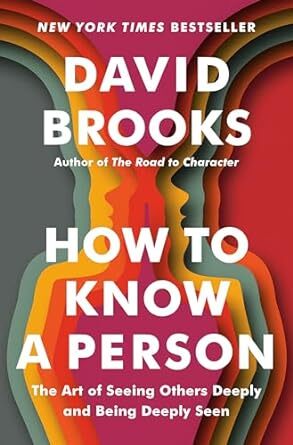
How to Know a Person is a practical, heartfelt guide to the art of truly knowing another person in order to foster deeper connections at home, at work, and throughout our lives—and to find the joy in being seen.
Let us all strive to be Illuminators, seeing the humanity of everyone we meet, and remembering what we share: Jesus was willing to die for us, and God made us in His image.
David Brooks is one of the nation’s leading writers and commentators. He is an op-ed columnist for The New York Times, a writer for The Atlantic, and appears regularly on PBS Newshour. He is the bestselling author of The Second Mountain, The Road to Character, The Social Animal, Bobos in Paradise, and On Paradise Drive.
{ Our humble thanks to Random House for their partnership in today’s devotional.}
May 17, 2024
4 Secrets (in Grad Season), At The End of Seasons, When You’re Not Ready for All the Changes
This week, as one of ours prepares to don a cap and tassle and graduate… as so many friends processing kids graduating, processing new seasons of life… I keep going back to this glorious moment in time & my heart explodes a bit &. this is like a soul compass…
They made bubbles right out on the lawn at dusk.
The best way to prepare for what’s ahead is to be present to what is now.
As if you can lift and carry the thin skin of things.
As if you can wait for the space between stillness and wind, and rise.
Malakai, he wears faded jeans two inches too short, the hem just skimming the milky whites of his ankles.
Like his mother can never keep up and the kid looks like a ragamuffin stuffed on grace.
Like the kid just escaped from some flood plain, some dike country.
Shalom wears socks. Teal socks stealing right out on to the grass, shoes never occurring or unfurling anywhere in her blooming mind.
The roasting pan with the bubble soap mixture is Oma Voskamp’s, the one she left to me after she left us all, all gleamy steel, to baste turkeys in.







I thought we’d all defy time, that they’d grow up and stay little, that we’d have our cake and eat it too and we’d have it all.
That’s the one they’re slapping a bubble sluice around in. But really, c’mon now– who needs meat and bone when you can gnaw on the sheer sheen of light? Kai’s bare toes look like invitation.
I used to cup that bare heel of his, the way it dangled when he kept swallowing the leaking milk down. The way motherhood curdled time in me, and I thought they’d always be little and here forever, close.
I thought there’d always be sand and Tonkas and footed pajamas, and always a place at the table and their shoes at the back door. I thought there’d always be stacks of picture books and read alouds and legos everywhere. I thought we’d all defy time, that they’d grow up and stay little, that we’d have our cake and eat it too and we’d have it all. A head can think otherwise but somehow a heart can feel wiser.
Shalom runs to catch one wobbly bubble lifting, holding her hands right out.
As if you can hold on to hallowed skins.
You don’t get to keep all the moments. You just get to witness all the moments.
“Don’t crush it, Shalom!” Kai yells at her across the lawn.
“Let it go!“
You don’t get to keep all the moments. You just get to witness all the moments. Shalom laughs as it rises.
This is what you have to know about time: You don’t get for always. But you always get to awe in the time you’re given.
“See it, Kai? See it?” She can’t stop clapping.
If you don’t take it all as gift, you end up taking it all for granted — which amounts to not taking much good from life at all.
“How do you make each smallest bubble so big and grand, Kai? HOW?“
They stay out late on the front lawn. Until the turkey roasting pan has no bubble feast left.
I can’t leave them and their witnessing.
There’s soup for supper.
And a disaster of dishes splayed all over the counter.


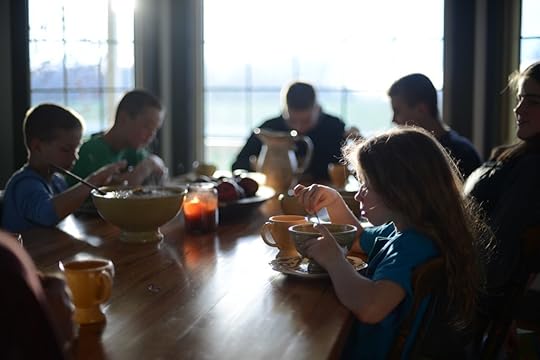
This is what you have to know about time: You don’t get for always. But you always get to awe in the time you’re given.
And there’s Caleb at the end of the table, giving us all his Coles notes version of Austrian economics versus Keynesian.
And Levi asking if the soil temperature is ready for planting beans yet and Kai negotiating for Copper Marans hens because he’ll feed and water them everyday, promise.
Shalom’s drinking soup out of her bowl like a cup, evening light spilling all down her.
And the phone rings somewhere on that messy counter. And we stop, all of us stop and listen, the answer machine recording.
“This is admissions from Trinity Western University,” her voice is high and chirpy, and what is that lump low in my throat?
They can cut umbilical cords — but nothing can ever cut heart strings.
“And we were wondering if we might set up an appointment to speak to Caleb about his scholarship and possible acceptance?“
And I shake my head no.
No. No we cannot set up an appointment to talk about our farm boy with a cow-lick and big dreams driving 3,600 miles across the span of a country and leaving us and here and this table.
No, no, I’m not ready for now to be over, for the kid who wore a tool belt strapped around him everywhere to leave, the boy who can drive a tractor and wrestle hogs and reads Adam Smith’s “Wealth of Nations” just for fun — just to go. He drove me crazy. He drove me to God. He drove me to love.
I don’t care what anyone says — You can cut umbilical cords but you can’t cut heart strings.
You can’t sever the sinews of a family, the way the grass under the swing and the loudness of living and the doors slamming and butter dripping corn on the cob on the porch all get into all of you and how we wind around each other so maybe we never leave each other, only carry each other? I look down to the end of the table.
And the oldest son, he’s looking at his Dad and I, and he’s nodding his yes.
The boy, he’s towheaded and 7-years-old all over again and I’m watching the way a bubble lingers and lifts and he looks me in the eye, asking without words, and my chin trembles, fragile too, and the words smile and push brave around that lump:
“Isn’t that what Dr. Seuss had said?
“Don’t cry because it’s over, smile because it happened.“
And I laugh brave.
And the boy nods brave.
And every milestone moment always forks and you get to choose which road you’ll go — bitter or blessed.
And the Happening People smile because it happened at all.
“Dr. Seuss said really that?” Hope pours a cup of water, looks over at her grinning, brimming mama.
“And I know what else he said!” Shalom pushes back her chair, already running — and singsong her Dr. Seuss book back to the table:
“A, a, a, What begins with A?“
And I can close my eyes and say it –” Aunt Annie’s Alligator, A, A, a.“
And it comes, like all the years, all the laps and all their heads on shoulders, all their eyelashes dozing off. “Big B, Little b, What begins with B?
Barber baby bubbles and a bumblebee.”
Don’t grieve that it’s all gone, wonder that it was at all.
“You remember the whole book, Mama?” Shalom leans across the table, book in hand and big-eyed.
And I can see it on the page and how they each felt close, pressing in: “W..w..W…Willy Waterloo washes Warren Wiggins who is washing Waldo Woo.”
And Shalom laughs giddy and I look around the table at the sheen on now and all their faces, the hallowed skin of them all rising, and how was there any of this at all?
And I witness each of them, nod at the lanky boy at the end of the table, at time and the passing of a season, at the thinness of everything drifting and how life just keeps meaning change.

Don’t grieve that it’s all gone, wonder that it was at all.
Laugh that you lived and dance that you dared.
Inhale that it happened — and it was grace.
And I memorize the light and the mess of us and the ABC’s of living and them all here and us right now and that — that is how to make the smallest life big and grand —
The best way to prepare for what’s ahead is to be present to what is now.
Be present to the gift of now.
And right then —
the sheer sheen of grace on everything lights.

How do you actually practically find way through season of change to — and find the embrace and comfort of God?
What does it personally look like to turn toward God in the midst of changes — instead of turning away?
In the midst of changing seasons:
What does it powerfully look like to have a new way of life, a new way of being that rests fully in the hesed loving kind ways of God?
The practical tool to begin true life-transformation for a different way of life start here:
WayMakerMay 16, 2024
How to Find Care & Experience Worry-Defeating, Circumstance-Defying Happiness
For the past five years, author and pastor Randy Frazee has been researching this question: “What does it mean to be full of joy?” As it turns out, God has shown us many ways to have a peace-filled, happy heart—and one of those paths is to cast our many cares on him. It’s a a real joy to welcome Randy to the farm’s table today…
Guest Post by Randy Frazee
Every summer as a boy, our family would travel a little over three hours by wood-paneled station wagon from Cleveland, Ohio, to southwest Pennsylvania to visit relatives.
One summer day, two of my cousins and I took off on bicycles. We were heading to the top of the hill leading into the neighborhood. It was so steep that we had to walk our bikes up the last fifty yards or so. It was a dirt road, with the exception of that last fifty yards, which was heavily layered with gravel.
We got up to the top of the hill a little winded. But within seconds, we were back on our bikes with the wheels faced downhill. Away we went. Because of the incline, our speed increased quickly. The ride was bumpy due to the heavy gravel. Adrenaline was pumping throughout my body.
I was living the dream!
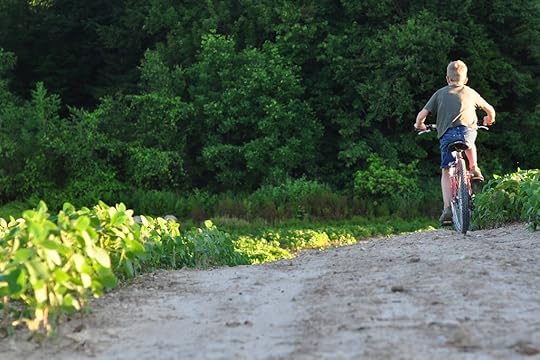



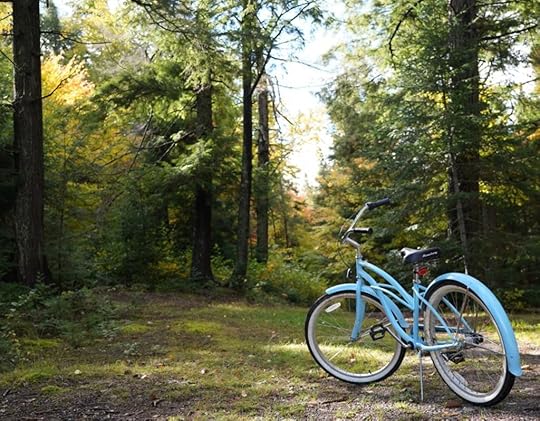
Then, out of nowhere, the two handlebar grips on my bike came off and the front wheel immediately and suddenly turned perpendicular to the road.
I went flying over the handlebars.
While suspended in midair, I quickly made the decision to break my fall and protect my head (we didn’t wear helmets back then) by sticking out my hands and arms to absorb the impact.
As my body made contact with the gravel, I could feel the skin breaking first on the palms of my hands, then my arms, and finally on my kneecaps. Turns out my cousins, as a joke, had poured dishwashing soap inside the handlebar grips so they would slide off. I stood up and immediately noticed the blood.
Terror overcame me as I quickly scanned the extent of my injuries and began to process the betrayal of my cousins. As I took off in full stride, screaming, I kept shouting out only one word. Can you guess what that word was?
“Mom!”
I was screaming her name as I entered the house.
“Instead of engaging in the unproductive and physically and psychologically damaging act of worrying, we should cry out, “Abba, Father” to our heavenly father.”
She immediately jumped up and ran the rest of the way to me. As our eyes locked, with tears streaming down my face, I simply held out my arms. As soon as she touched my arm, my worry and anxiety washed away. I had officially given the problem to my mother, and she took it from there. I no longer needed to worry. She would know exactly what to do. It was her problem now, and she took on the assignment with great passion.
This is what Paul invited us to do in his letter to the Philippians, where he wrote: “Do not be anxious about anything, but in every situation, by prayer and petition, with thanksgiving, present your requests to God. And the peace of God, which transcends all understanding, will guard your hearts and your minds in Christ Jesus” (Philippians 4:6–7).
Instead of engaging in the unproductive and physically and psychologically damaging act of worrying, we should cry out, “Abba, Father” to our heavenly father (Abba is the Aramaic word for “daddy”).
This is who Jesus cried out to when his anxiety overwhelmed him in the garden of Gethsemane on the night before his crucifixion (Mark 14:36).
By the time he left the garden, his anxiety had subsided, and he was settled in his mind about what he needed to do, knowing his father was with him.
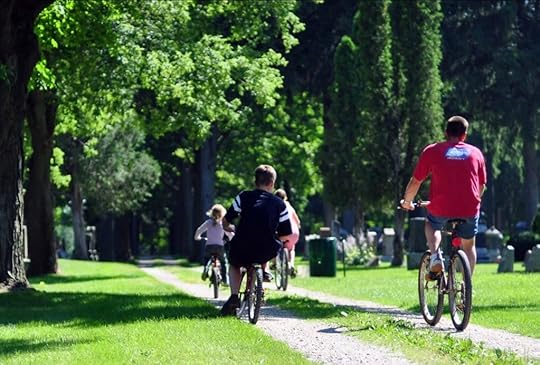


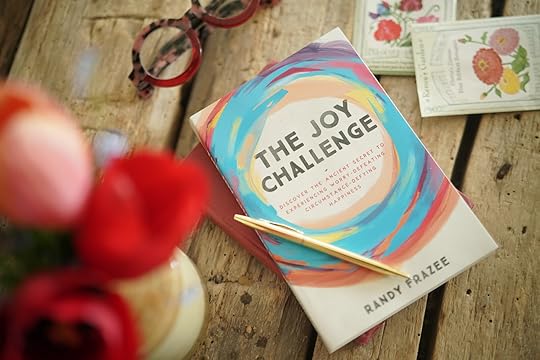
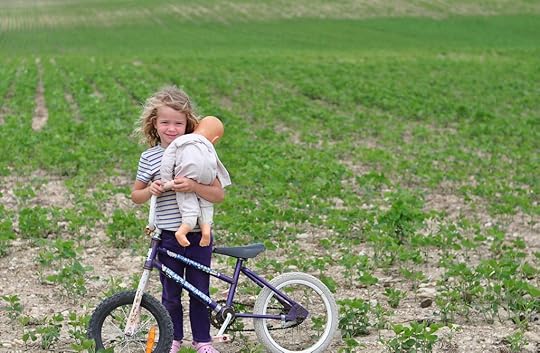
Paul recommended we do the same thing when we find ourselves overcome with anxiety:
“God already knows what is troubling us, but he wants us to speak it to him.“
The Spirit you received does not make you slaves, so that you live in fear again; rather, the Spirit you received brought about your adoption to sonship. And by him we cry, “Abba, Father.” (Romans 8:15)
Prayer is a conversation, a plea, a request, all given to a person, in this case the supreme person of the universe who can hear, know, understand, care about, and respond to the concerns that otherwise would sink us in despair.
God already knows what is troubling us, but he wants us to speak it to him.
So, the next time you find yourself flying over a set of handlebars headlong into worry, immediately get up and start running toward God to surrender what troubles you.
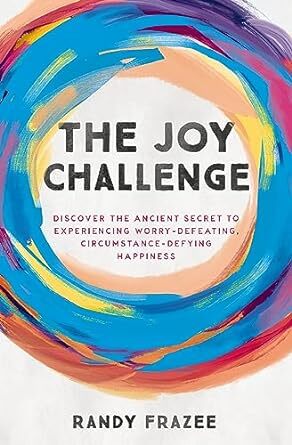
Randy Frazee is a pastor at Westside Family Church in Kansas City. A frontrunner and innovator in spiritual formation and biblical community, Randy is the architect of The Story and Believe church engagement campaign.
He is also the author of The Heart of the Story; Think, Act, Be Like Jesus; What Happens After You Die; His Mighty Strength; The Connecting Church 2.0; and The Christian Life Profile Assessment. He has been married to his high school sweetheart, Rozanne, for over forty years. They have four children and five grandchildren, with more on the way!
In Randy’s newest book, The Joy Challenge, he shares the secret to experiencing real, lasting joy—and stepping into a life of contentment and purpose. To learn more about his work and ministry, go to randyfrazee.com.
{Our humble thanks to Thomas Nelson for their partnership in today’s devotional.}
May 14, 2024
An Invitation to Abide in the Shelter of the Good Shepherd
Kristen Welch and I are sorta, kinda, really soul sisters… As I served on the board of directors of the ministry Kristen founded, Mercy House Global, and we serve together to dream up for you the best #FAIRTRADE beauty of The Grace Case and the Grace Flame Candle subscription that supports local refugees while funding the Kenyan maternity homes of Mercy House — so I get to see it first hand again and again, what we can all do together to change the world for women, if we say our brave yes. I absolutely love this woman with all my heart — it’s a grace to welcome my soul sister, Kristen, to the farm’s table today…
Guest Post by Kristen Welch
The group leader pushed the box of tissues on the table in front of me indicating it was my turn in the circle.
She waited for me to begin, but I paused too long as I struggled for the words to describe how life had brought me to this unexpected moment. I took a deep breath and with shaking hands, twisting a tattered Kleenex, in a quivering voice, I shared a brief version of my story.
My own words sounded like a foreign language, strange to my ears as I spoke them. Mid-sentence, I shuddered from the shock of them.
I was heartbroken.
A single tear slid down my cheek and the dam behind it threatened to break.





I have been sitting at tables with marginalized women for the past 15 years as the founder and CEO of Mercy House Global, a nonprofit ministry that empowers vulnerable families with opportunities that create hope in Jesus’ name, but this was the first time I showed up as one.
I wasn’t sitting in the circle to empower the vulnerable with my strategic ideas or offer life-giving programs that the non-profit I work for provides; I was there to share my own grief and receive comfort.
“There is something holy about our pain in our most tender moments that is also wildly humbly.“
There is something holy about our pain in our most tender moments that is also wildly humbly.
In a blink of an eye, any of our lives can change overnight and we might find that we need sanctuary, too.
When we open the door to our sorrow, we see Jesus. He is the Good Shepherd, who tenderly and lovingly cares for us. Jesus isn’t hard to find, He is always near, but if you’re looking for Him, start with the vulnerable. Jesus is always among those in the margins.
He leaves the ninety-nine and goes after the one.
The group leader spoke gently to the circle and drew from her own experience, “It might not feel like it today, but you are actually being rescued. One day you’ll look back and see that this is a rescue.”
I immediately thought of the work of Mercy House Global and how God has provided for 83 rescues of pregnant teen girls in Kenya and their precious miracle babies, how against all odds, they have been delivered from traffickers, oppression and dangerous situations and safely brought into homes filled with love. They have been invited into a sisterhood of second chances, a place to share their grief, heal from their trauma and be introduced to Jesus, the Good Shepherd.
While my rescue has been nothing daring or harrowing like theirs and cannot be compared in any way, we do share the same loving Savior.
“It’s possible to taste and see that the Lord is good in the valley of the shadow of death.“
My own personal experience has opened a door into the presence of God that I’ve never quite known before.
It’s possible to taste and see that the Lord is good in the valley of the shadow of death. I will never show up to a table to empower vulnerable women again in the same way.
Jesus said in Luke 15 “And when he has found the lost sheep, he will joyfully carry it home on his shoulders…saying “Rejoice with me because I have found my lost sheep.” The Shepherd sees each of His sheep as priceless. You are priceless. I am priceless.
She is priceless.


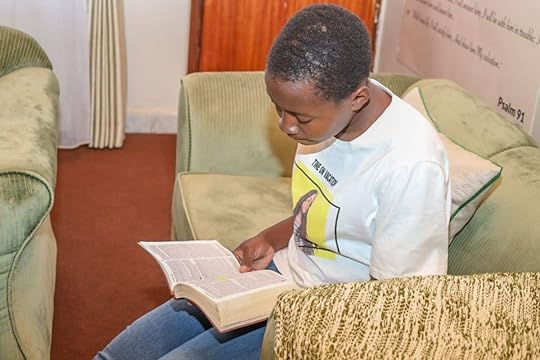

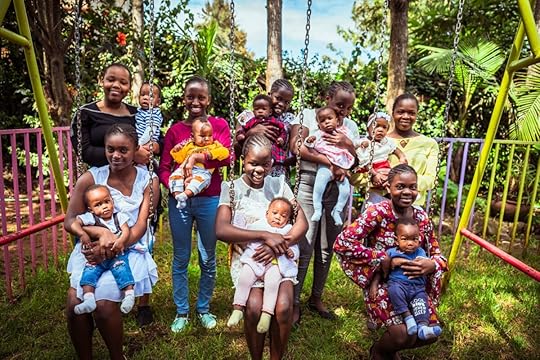
Jesus invites each of us to abide in the safety of His shelter. He doesn’t reserve it only for the marginalized. He invites each of us and wants us to remember that without Him we are vulnerable.
Abiding is related to the word abode which means the place someone lives. When we abide in God, we are connecting ourselves to Him.
To abide in Christ is to step into the safe house that is God.
Abiding in Jesus, our Good Shepherd, offers us safety, peace, trust and provision for life.
“Jesus invites each of us to abide in the safety of His shelter… He invites each of us and wants us to remember that without Him we are vulnerable. “
Mercy House Global is creating loving environments for vulnerable women to abide from the harshness of life. We offer shelter from the brutal realities of oppression, sanctuary from life’s storms, encouragement to the hopeless, opportunities to the vulnerable, and access to a God who speaks this truth over each one:
You are priceless.
Every year, the Tuesday after Mother’s Day, Mercy House Global hosts a giving day called She Is Priceless. Any way you look at it, providing shelter for the vulnerable isn’t cheap in today’s economy. The only way the empowerment programs at Mercy House Global continue is through the generosity of those who are abiding in God’s shelter.
He connects us all. He asks us to share our resources and reminds us that without Him, we would have nothing.
She Is Priceless is the day we pause and remember that women are the most oppressed people group in the world and proclaim that every woman, everywhere is priceless.
Jesus shepherds and shelters us all.

Do you ever wonder what it would be like if every girl and every woman knew she was unconditionally loved, valued, and worthy? It is our WHY. It’s the reason we exist. It’s the reason we keep fighting for the vulnerable.
Today is She is Priceless Global Giving Day—would you consider how you can partner with us to support the work of Mercy House Global and remind every woman around the world that She is Priceless? We LOVE and trust and support the work of Mercy House Global and would LOVE if you join us in supporting and loving these vulnerable women around the world.
Mercy House Global exists to engage, empower and disciple women around the globe in Jesus’ name. We fund two residential maternity homes and a transition home in Kenya for pregnant teens. Mercy House Global also supports over 40+ faith-based nonprofits in 30+ countries by helping these organizations sell products that employ women artisans through four subscription clubs.
Would you give your best gift today to help Mercy House Global meet urgent needs?
May 13, 2024
How Do You Process All The Pain in the World?
This woman is just pure joy. Her smile lights up a room. And yet. Ashlee is willing to thoughtfully embrace the messy, difficult conversations . . . pain, injustice, division—those tense times when you wonder whether to become invisible or speak up. How does she find the courage and the right words? Her new book, Say Good, helps us all recognize the need for our voice to be heard at the right time. She reminds us of Jesus’ intense love for each one of us. That’s why I’m pouring two big cups of tea as I welcome Ashlee Eiland to the farm’s front porch today . . .
Guest Post by Ashlee Eliand
“Jesus wept... These two words are less fancy fluff and more like faith boulders. They pin my experience of Jesus as fully human and fully God securely beneath the testimony of very human emotions. “
“Jesus wept.” (John 11:35)
My mother used to say this prayer almost every night at our dinner table.
It was just the three of us: my father, myself, and her. But all of us would offer grace before the meal. I’d offer the standard yet classic “God is great, God is good,” my dad would offer more of an off-the-cuff, in-the-Spirit prayer—and my mom would round the grace out with these two simple words. Jesus wept.
Sometimes I thought those two words were kind of a Christian cop-out, a way to more expeditiously get to my daddy’s smothered pork chops and lima beans or my mom’s fried fish and taco salad (yes, a side). But now I understand: These two words are less fancy fluff and more like faith boulders. They pin my experience of Jesus as fully human and fully God securely beneath the testimony of very human emotions.
Jesus, Savior of the world, wept.






Just before this shortest verse in the Bible, Jesus saw his friend Mary weeping.
Her brother, Lazarus, was dead. And when Jesus saw Mary weeping, he was “deeply moved in his spirit.” (John 11:33) Not like you or I would be moved by an old episode of This Is Us, or on the other end of a puppy commercial featuring Sarah McLachlan’s “In the Arms of the Angels,” or at the closing scene of Disney’s Coco. When the text says Jesus was “deeply moved,” it’s likely referring to indignation. This “deeply moved” was more like an inward groaning, a stirring of spirit, a response to his friend’s grief.
“Could it be that whatever moves us to tears, whether injustice or grief or loss or disruption, is enough to move Jesus, too? “
Mary’s tears moved Jesus to tears. Could it be that whatever moves us to tears, whether injustice or grief or loss or disruption, is enough to move Jesus, too?
Jesus weeps one other place in the Gospels. Shortly after he enters Jerusalem, riding on a colt with a multitude praising God, Luke’s account describes Jesus weeping over the city and saying, “Would that you, even you, had known on this day the things that make for peace! But now they are hidden from your eyes.” (Luke 19:42)
While the weeping we encounter in John 11 is reflective of the Greek dakruō, which typically refers to the shedding of tears, the kind of weeping Jesus offers over Jerusalem is described using the Greek term klaiō, which usually refers to a louder expression of grief, such as sobbing or wailing aloud (as explained in Strong’s Greek Dictionary of the New Testament).
Undone, unhindered, Jesus weeps over a city he knows is missing the life he offers: abundant life for every person inside and outside its walls. In just a few days, crowds of people will shout for his crucifixion. His disciple Judas will betray him for money. Another one of his disciples, Peter, will deny knowing him—not one, not two, but three times. A handful of decades later, the city will be destroyed by the Roman military.
“Holy discontent invites us to notice. Injustice invites us to weep.“
Jesus wept, he wailed, over injustices to come—both during his journey to the cross and upon a city he longed to be saved. The hard-heartedness of a people would perpetuate cycles of brokenness. Jesus did not want it to be so.
If holy discontent is at the intersection of your yes and the Good News—if it takes hold of your heart—it might just be what moves you beyond discontent to the vulnerable posture of one who weeps.
Holy discontent invites us to notice. Injustice invites us to weep.
What are you willing to weep over?






Without the aching pain of our wails, a passion created by holy discontent and sustained by experience can petrify our hearts over time.
Without our tears, our hearts have few options but to harden. But when we let ourselves weep, we grow more tender to the point where our whole selves—hearts, hands, bodies, and voices—might join our rage and our grief.
“Weeping is vital to our ability to speak good from a place of wholeness. “
We learn that our weeping, in fact, is not meant to be scolded into the corners of our stories. Weeping is vital to our ability to speak good from a place of wholeness.
If you were taught not to cry, that weeping meant you were weak or less of a person, that piles of crumpled tissues meant they’d never take you seriously—remember that Jesus wept.
His friend’s grief was enough to move him. The gap between his hope and how a people would turn against him was worthy of his groans.
Injustices are more than simply opportunities for cathartic emoting.
They create a chasm and give us a place to go.
They show us where to set up next.
They anchor us to a place, bringing focus and intention.
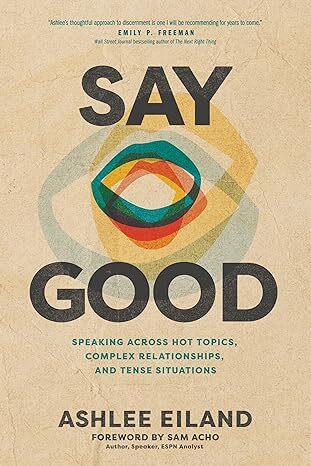
Ashlee Eiland is a thought leader, writer, and Bible teacher who is deeply committed to advancing God’s redemptive work here on earth. Her work has one purpose: to help humanity build bridges back to the truth of who God is and between one another in whole and healing relationships. Ashlee leads as vice president of partnerships for The Colossian Forum, a non-profit that works to harness the power of disagreement to restore connection. She has served as a coach and cohort leader with Women Speakers Collective and previously served as co-lead pastor at Mars Hill Bible Church in west Michigan. Watch for the forthcoming documentary, Leap of Faith, which features Ashlee and the work of The Colossian Forum on personal transformation and communal reconciliation. Ashlee and her husband live in Grand Rapids with their three kids.
The excerpt that she shares today is from her new book, Say Good: Speaking across Hot Topics, Complex Relationships, and Tense Situations. In Say Good, Ashlee helps you discover the power of stewarding your unique voice. Using a four-part discernment process of passion, accountability, influence, and relationship, you’ll discover the spaces, ways, and times where your words are needed. As you do, you’ll find the conviction and confidence to speak up in even the most flammable challenges.
The world isn’t getting any easier. Say Good is a timeless resource that will help you find your voice and speak with love and confidence into the division, injustice, and pain around you.
{Our humble thanks to NavPress for their partnership in today’s devotional.}
Ann Voskamp's Blog
- Ann Voskamp's profile
- 1368 followers



